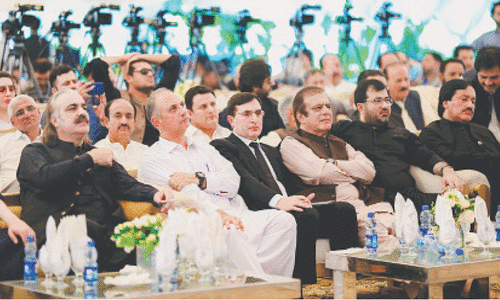ISLAMABAD: Justice Shaukat Aziz Siddiqui has levelled serious allegations about external interference in judicial affairs and said that the independence of the judiciary has been usurped.
Addressing the Rawalpindi Bar Association on Saturday, Justice Siddiqui claimed that the Inter-Services Intelligence (ISI) is “manipulating judicial proceedings as its officials manage to constitute benches at its will and mark cases to selected judges”.
However, Justice Siddiqui offered no evidence to support the claims he made.
He said, “The ISI approached the Chief Justice of the Islamabad High Court (IHC) and told him that they don’t want release of Nawaz Sharif and his daughter before elections.”
Lawyers top body demands probe into IHC judge’s allegations of meddling by security agency
IHC Chief Justice Mohammad Anwar Khan Kasi had not included Justice Siddiqui, the senior puisne judge of the IHC, in the division bench constituted to hear the appeals.
The accountability court of Islamabad on July 6 had convicted the former prime minister, his daughter Maryam Nawaz and son-in-law retired Capt Mohammad Safdar in the Avenfield reference and awarded them 10-year, seven-year and one-year imprisonment, respectively.
Justice Siddiqui said, “I know how messages have been conveyed to the Supreme Court, I know where the record of proceedings of the accountability court was dispatched every day and why the statutory provisions allowing the IHC to exercise administrative control of the accountability court was ceased. This was to stop the IHC judges to monitor the trial proceedings.”
The Supreme Court in its July 28, 2017 judgement had disqualified Mr Sharif from holding public office and directed the National Accountability Bureau to file three references against him and his children in the accountability court. The apex court had also appointed Justice Ijazul Ahsan as the supervisory judge to monitor the trial proceedings.
As per the statutory provisions, administrative judges of the high courts supervise subordinate judiciary, including special courts.
Justice Siddiqui claimed that the ISI men offered him that they would not only manage to quash a reference pending against him in the Supreme Judicial Council (SJC) but also ensure his elevation as chief justice of the IHC even in September, instead of November when Chief Justice Kasi was going to retire.
Before the SJC, Justice Siddiqui is facing two references — one related to spending of an excessive amount on maintenance of his official residence beyond entitlement and the second over passing ‘derogatory’ remarks against the armed forces.
The judge said that officials of the secret agency were expecting a favourable response from him over their offer “but I flatly refused and replied that I would prefer to die than sell my conscience.”
“I don’t care about my job. I even know the consequences of sharing the truth with you but I am not afraid even if I am assassinated,” Justice Siddiqui said.
He said that the bar and the bench were from the same family “but our home has been invaded by armed men and independence of the judiciary has been usurped”.
Justice Siddiqui also criticised media for “bowing down before the power corridors” saying that due to vested interests and advertisements, media was toeing the line set by the Inter-Services Public Relations (ISPR), the public relations wing of the armed forces.
“The ISPR not only sends the media press release but also forwards them contents to be included in tweets,” he said.
If freedom of the judiciary and media was usurped, then Pakistan would not be an independent Islamic and democratic state, Justice Siddiqui said.
In the past, he said, the judiciary had validated and facilitated dictators. Justice Munir invented the doctrine of necessity and was rewarded with the position of law minister in the cabinet of Gen Ayub Khan. Likewise, Justice Irshad Hassan Khan validated the military coup of Gen Pervez Musharraf and was appointed chief election commissioner.
A large number of lawyers attended the event and raised slogans in support of Justice Siddiqui and independence of the judiciary.
The president of the Lahore High Court Bar’s Rawalpindi bench chapter, Hassan Raza Pasha, and IHC Bar Association General Secretary Raja Faisal Younus were also present in the bar room during the address of Justice Siddiqui.
Meanwhile, the Pakistan Bar Council (PBC), reacting to the claims made by Justice Siddiqui, has demanded an investigation into the allegations.
Talking to Dawn, PCB Vice Chairman Kamran Murtaza said that since the allegations had come from the senior most judge of the IHC, the issue must be probed by a parliamentary committee.
He said that the issue could not be taken up by the SJC under Article 209 of the Constitution since it was related to the judges of the apex court, a parliamentary committee comprising opposition parties in the Senate was the relevant forum to examine the allegations levelled by Justice Siddiqui.
Published in Dawn, July 22nd, 2018













































